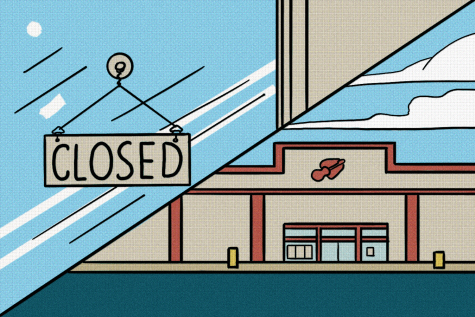Chicago music stores create a pandemic survival plan
December 16, 2020

As the spread of the coronavirus has increased in recent weeks, music stores around Chicago, and nationwide, are gearing up for what could be another trying period for businesses. However, the pandemic has hit local music stores in an unexpected way, boosting sales for some while inhibiting business for others.
Frank Alkyer, an adjunct faculty member in the Communication Department, is well-versed in the trials and tribulations of what it takes to run a music store. As the publisher of Music Inc. Magazine, a trade publication for “guys who run guitar shops,” Alkyer has been monitoring the ways in which the pandemic has hit music stores.
Alkyer said music stores that have been able to pivot to online retail, like the Chicago Music Exchange, 3316 N. Lincoln Ave., and Reverb, 3345 N. Lincoln Ave., have brought in revenue despite challenges presented by the pandemic.
But, physical retailers who have not been able to make the switch are in a trickier position.
“There’s no question that in the musical product side of the business, we tell music retailers … you’ve got to be proactive about being an online retailer, or being a 360-degree retailer … [which means] you have all these different ways to sell. You can sell through email; you can sell through your website; you can sell physically,” Alkyer said.
Many stores offer music lessons, classes and more to help generate revenue, Alkyer said, raising the question of how one can teach music during a pandemic.
Tim Joyce, retail director at the Old Town School of Folk Music, 4544 N. Lincoln Ave., was one of the people who worked to find an answer.
“[When the pandemic hit], a good chunk of employees were furloughed or ended up in unemployment straight out of the gate,” Joyce said. “We quickly had to pivot to putting a real intense focus on online, which is something we hadn’t been [doing].”
He said his store, which is located within the Old Town School of Folk Music and sells instruments and merchandise for the school, was struggling to grow and work through financial setbacks, but there has been a heightened focus on online retail to supplement revenue lost during the pandemic.
Joyce said the Old Town School of Folk Music saw around 5,000-6,000 students a week on a regular basis before the pandemic. To adapt to social distancing requirements, the school had to pivot to online lessons. Joyce said the number of students taking online lessons accounted for nearly 90% of the typical attendance over this past year.
“Since then, we’ve sort of exponentially grown that business in the past six or eight months. It’s been great,” Joyce said. “Early on, it was very, very busy. Everyone was deciding, ‘I’m going to be home for a month or two, and I’ve always wanted to learn guitar. Now’s the time.’”
Nick Bilski, a senior contemporary, urban and popular music major, has seen this new interest in picking up an instrument firsthand as a teacher and floor worker at Guitar Center, 7250 S. Cicero Ave. But, Bilski said he feels sorry for smaller stores that are suffering due to the lack of physical retailing.
For stores that have smaller maximum capacity limits and require appointments in advance, it poses another challenge because people cannot physically interact with the instruments, Bilski said.
Corporate music stores often have additional resources, such as greater revenue, capacity and a more employees to sanitize their space to be able to stay open.
Bilski also said the connection between a musician and their instrument is an important aspect of music shopping, and so the inability to test an instrument firsthand has steered many musicians away from buying new instruments.
“Most musicians I talk to, they’re like, ‘I’m never buying a guitar unless I can actually feel it in my hands,’” Bilski said. “Either you can set up an appointment, and maybe nobody’s gonna get back to you at one of the smaller stores … or you could just go to Guitar Center where they have it and buy it there. So it’s really screwing them in that way.”
Because of this, the gap that has begun to emerge during the pandemic between local and corporate music stores may balloon in the future, Bilksi said.
Regardless of how the pandemic ultimately affects music stores, Alkyer said one thing is clear: Online retailing “is hands down the future of retail, and everybody is going to be on board with that after this pandemic.”







